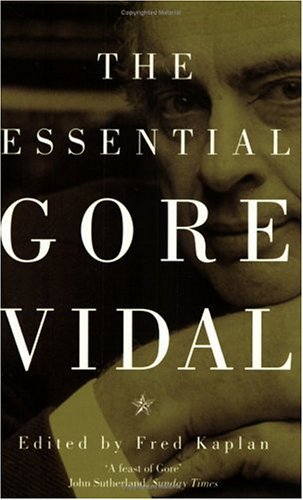This is a wonderful book! As expected in a collection of this sort, not everything was to my taste (i.e. Myra Breckinridge) but the variety of quality writing ensured there were lots I did love! It is divided into sections: Early Fiction, Theater Writings, Inventions, Religion, Chronicles of American History and Essays. From the outset I was impressed with the introduction by Fred Kaplan. He provided excellent context for the uninitiated without giving the game away.
I enjoyed each piece in the Early Fiction section. They were beautifully written and very engaging.
‘The Best Man’ in Theater Writings was my absolute favourite. This political play is timeless. Loved it!
The Inventions section was my least favourite. I found ‘Myra Breckinridge’ disturbing and gratuitously graphic. I understand why it was so controversial for its time and I was ultimately disappointed with the ending. ‘Duluth’ had an interesting premise, very relevant to our current preoccupation with TV and celebrity.
I enjoyed the Religion section. The excerpt from ‘Julian’ was written from an interesting perspective and a pleasure to read. ‘Creation’ was written in a very similar style as Plato’s dialogues. I loved the subject matter, the conversational style and the language. It was reminiscent of ‘Symposium’. ‘Live from Golgotha’ is based on a very unusual concept. Timothy is to rewrite the bible for a time travelling apostle. It is a mix of contemporary references and biblical times.
The Chronicles of American History section was a bit hard going at times. I didn’t think ‘Burr’ was the most interesting. There was lots of toing and froing, names and dates. It is probably better suited to those who love reading historical ‘fiction’. I did enjoy the ending of that chapter set in Amalfi. That was a good twist. ‘Lincoln’ is very cleverly written. It is fast paced and witty. It follows the inauguration of Lincoln, the Civil War and his assassination. Vidal doesn’t pull any punches regarding his political views. The final section of this chapter addresses Vidal’s/Hay’s obvious respect for Lincoln and his legacies, especially in comparison to Washington and his. ‘1876’ is beautifully written, entertaining and light. I loved the big twist at the end of this section! ‘Empire’ is an insider’s view of politics at a very specific point in time. I found there were too much conversation and far too many characters to follow. ‘Hollywood’ explores the connection between the media (Hearst) and politics (President. W. Wilson). It was okay. Not my favourite, but interesting. The final chapter in this section, ‘Washington, D.C.’ presents the back room dealings from the perspective of Senator Day, who has aspirations of being president. This was pretty good.
The final section, Essays, is excellent. It includes twenty five essays dealing with various issues, ideas, and a host of interesting protagonists. Each one was exquisitely written, insightful and engaging.
Before reading this collection I was a Vidal virgin. Now I feel I have a good grasp of the range and quality of his work. I thoroughly recommend this book to anyone wanting to become acquainted with this remarkable writer.

